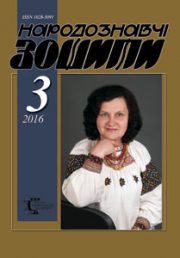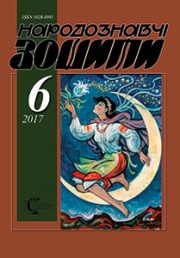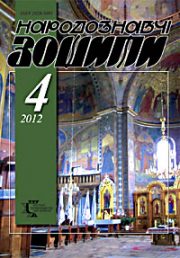The Ethnology Notebooks. 2019, 2 (146), 416—422
UDK 398.341(477+478)”…/20″
DOI https://doi.org/10.15407/nz2019.02.416
FAYNYK Tetyana
ORCID ID: https://orcid.org/0000-0001-8446-4002
Candidate of Historical Sciences,Senior Researcher
Ethnology Institute of National Academy of Sciences of Ukraine
15, Svobody Avenue, 79000, Lviv, Ukraine
Contacts: e-mail: t.faynyk@gmail.com
Abstract. On the basis of rituals and traditions, collected during the expeditions and preserved in folk construction, the author sets himself the goal of indicating their identity in the spiritual culture of the Ukrainian villages of the border with the spiritual culture of the entire Ukrainian nation. We used the historical-comparative method and methods of field ethnography in our study. On the basis of field research materials within the boundaries of the Ukrainian-Moldovian border area, the traditional folk periods of the pre-Christian action and Christian sacred practices related to the construction of housing are highlighted.
Attention is accentuated on the marked tendency to strengthen the Christian element in the building traditions of our time. The object of the study is the people’s residential construction of the Ukrainian borderland, and the subject — traditions, rituals and beliefs in its edification. The main task of this study is: to establish a connection between the preserved and existing traditions and rituals of the borderline, the identity of the spiritual culture of the Ukrainian villages along the borders with the spiritual culture of Ukrainians in general; to demonstrate resistance of the pre-Christian and Christian customs that led to the formation of ritual ceremonies. Construction of new housing has long been one of the most important events in the life of a peasant. People has linked their hopes to a new, happier life with their entrance to the new home. In the past, human life was largely dependent on nature. The struggle against the natural element, the desire to satisfy its various ways, thus ensuring the reliability and durability of the new home, the well-being of the owners are reflected in different beliefs, traditions and ordinances.
Based on the information obtained, one can conclude that traditional folk knowledge, traditions and rituals related to the construction of housing, reveal the outlook and spiritual life of the inhabitants of the Ukrainian-Moldovian borderland.
It can be stated that the rituals and traditions of the Ukrainian-Moldovian frontier, connected with the construction of housing, have been preserved and nowadays indicate the identity of the spiritual culture of the Ukrainian villages with the spiritual culture of the Ukrainian people in general. Christian traditions were more stable than the ancient pagan ones.
Keywords: border area, traditions, beliefs, customs, symbols, construction, ritual of entrance, consecration, Christianity, prayer.
Received 31.01.2019
REFERENCES
Fainyk, T. Report on the scientific expedition of Odessa region; 03.07—10.07.2002. In The Archive of Institute of Ethnology of the National Academy of Sciences of Ukraine. Materials of expeditions. Exp. 439 [in Ukrainian].
Fainyk, T. Report on the scientific expedition of Chernivtsi region; 12.07—22.07.2002. In The Archive of Institute of Ethnology of the National Academy of Sciences of Ukraine. Materials of expeditions. Exp. 442 [in Ukrainian].
Fainyk, T. Report on the scientific expedition of Moldova region; 12.07—26.07.2004. In The Archive of Institute of Ethnology of the National Academy of Sciences of Ukraine. Materials of expeditions. Exp. 471 [in Ukrainian].
Fainyk, T. Report on the scientific expedition of Moldova region; 5.08 — 20.08.2005. In The Archive of Institute of Ethnology of the National Academy of Sciences of Ukraine. Materials of expeditions. Exp. 472 [in Ukrainian].
Tetyana, Fainyk. (2007). Habitation and environment: Building traditions of Ukrainians in Carpathians. Lviv: National Academy of Sciences of Ukraine. Institute of Ethnology [in Ukrainian].
Grebin, I. (1994). Rites related to the construction of rural housing. In Podillya: Historical and ethnographic research (Pp. 243—250). Kyiv: Dolia [in Ukrainian].
Ivanov, P.V. (1889). Folk customs, beliefs, omens and riddles relating to the Little Russian hut. Materials for the characteristics of the outlook of the peasant population of Kupyansk district. In I.P. Literary and scientific annexes to the «Kharkov Calendar» for 1889. Issue III (Pp. 33—66). Kharkiv: Kharkov collection [in Russian].
Popovich, Yu.V. (1972). From the history of Moldavian klaka. Ethnography and art of Moldova (Pp. 38—39). Kishyniv [in Russian].







